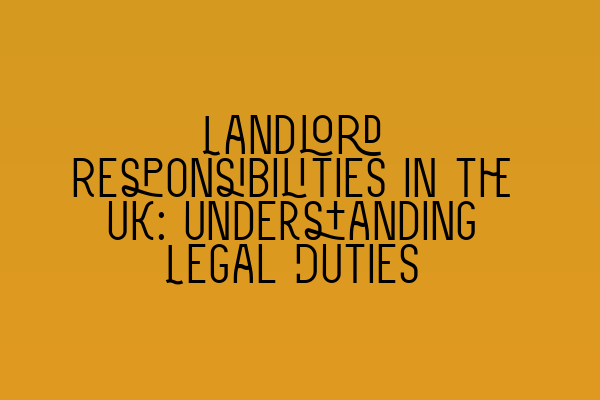Landlord Responsibilities in the UK: Understanding Legal Duties
Being a landlord in the UK comes with a range of legal responsibilities that must be understood and fulfilled. By understanding these duties, you can maintain a good relationship with your tenants, avoid legal issues, and ensure the smooth running of your rental property. In this article, we will explore the key landlord responsibilities in the UK and provide useful information to help you navigate the legal landscape.
1. Gas Safety
One of the most important responsibilities of a landlord in the UK is to ensure that all gas appliances and flues provided within the rental property are safe and regularly maintained. To comply with the law, you must arrange an annual gas safety check by a Gas Safe registered engineer. This obligation ensures the safety of your tenants and helps prevent potential accidents or gas-related hazards.
If you’re looking to prepare for the SQE 1 exam, you might find the SQE 1 Practice Exam Questions article helpful.
2. Electrical Safety
As a landlord, you have a legal duty to ensure that all electrical installations and appliances provided in the rental property are safe for use. It is advisable to hire a qualified electrician to conduct periodic electrical inspections, usually every 5 years or upon change of tenancy, to certify the safety of the electrical system. Promptly addressing any identified electrical issues is crucial to prevent potential hazards and meet your legal obligations.
If you’re interested in practicing for the SQE 1 exam, take a look at our SQE 1 Practice Mocks FLK1 FLK2 article.
3. Fire Safety
Another essential responsibility of a landlord is to ensure that the rental property is safe from fire hazards. This includes implementing adequate fire safety measures, such as providing fire alarms, extinguishers, and fire blankets, as well as ensuring proper escape routes in case of a fire. It is recommended to perform regular fire risk assessments and take appropriate actions to address any identified risks, thereby ensuring the safety of your tenants.
For those preparing for the SQE 2 exam, we offer comprehensive SQE 2 Preparation Courses to help you succeed.
4. Energy Performance Certificate (EPC)
Prior to renting out a property in the UK, you must obtain an Energy Performance Certificate (EPC). This certificate rates the energy efficiency of the property and provides recommendations for improvement. Displaying the EPC prominently in the property enables prospective tenants to make informed decisions and demonstrates your compliance with legal requirements.
For individuals preparing for the SQE 1 exam, we offer reliable SQE 1 Preparation Courses to boost your chances of success.
5. Security Deposits
When renting out a property, landlords must protect their tenants’ deposits in a government-approved tenancy deposit protection scheme. This is a legal requirement to safeguard tenants’ interests and ensure that deposits are returned fairly and promptly at the end of the tenancy. Failure to protect the deposit properly can result in severe penalties and legal consequences.
For information on upcoming SRA SQE exam dates, refer to our SRA SQE Exam Dates article.
6. Repairs and Maintenance
As a landlord, you are responsible for ensuring that the rental property is maintained in a good state of repair, both internally and externally. This includes promptly addressing any necessary repairs, such as plumbing issues or structural problems. Regular maintenance and repairs contribute to the overall safety and habitability of the property, increasing tenant satisfaction and minimizing potential disputes.
It is important for aspiring solicitors to familiarize themselves with relevant legal responsibilities, such as landlord obligations. Preparing for the SQE 1 exam? Check out our SQE 1 Practice Exam Questions to enhance your knowledge.
Conclusion
Understanding and fulfilling landlord responsibilities in the UK is crucial for maintaining a successful and legal tenancy. From gas safety to repairs and maintenance, each duty plays a significant role in ensuring the wellbeing of your tenants and complying with legal requirements. By staying informed and upholding your obligations, you can create a positive rental experience for both yourself and your tenants.
